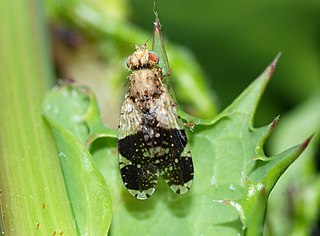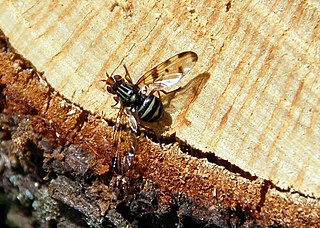
The Ulidiidae or picture-winged flies are a large and diverse cosmopolitan family of flies (Diptera), and as in related families, most species are herbivorous or detritivorous. They are often known as picture-winged flies, along with members of other families in the superfamily Tephritoidea that have patterns of bands or spots on the wings. Some species share with the Tephritidae an unusual elongated posteroapical projection of the anal cell in the wing, but can be differentiated by the smoothly curving subcostal vein. Two species, Tetanops myopaeformis and Euxesta stigmatias, are agricultural pests.

Tephritis is a genus of flies. It contains around 170 described species, making it the sixth largest genus in the family Tephritidae. Many more undescribed species are known from specimen collections. Tephritis occur throughout much of the world, but most are Palearctic. They can be found in a wide range of climate types, from hot semidesert to tundra. Most species inhabit the inflorescences of plants from several tribes in the family Asteraceae, and a few species cause galls to form.

Urophora is a genus of tephritid or fruit flies in the family Tephritidae.

Ceroxys is a genus of picture-winged flies in the family Ulidiidae.
Apotropina is a genus of fruit flies in the family Chloropidae.

Elachiptera is a genus of frit flies in the family Chloropidae. There are about 18 described species in Elachiptera.
Rhopalopterum is a genus of frit flies in the family Chloropidae. There are about 10 described species in Rhopalopterum.

Timia is a genus of flies in the family Ulidiidae, which is difficult to separate from the genus Ulidia.

Otitinae is the name of a subfamily of flies in the family Ulidiidae. It was formerly the Otitidae. Like the Ulidiinae, most species are herbivorous or saprophagous. Most species share with the Tephritidae an unusual elongated projection of the anal cell in the wing, but can be differentiated by the smoothly curving subcostal vein. Most are dull gray to shiny brown or black flies with vein R1 setulose or, in a few cases, bare.

Platystomatinae is a subfamily of flies (Diptera) in the family Platystomatidae that includes 80 genera, the largest subfamily with at last estimate, c. 900 species globally.

Pherbellia is a genus of flies in the family Sciomyzidae, the marsh flies or snail-killing flies. They occur throughout the world, except for the Subantarctic region.

Chloropinae is a subfamily of grass flies in the family Chloropidae.

Oscinellinae is a subfamily of frit flies in the family Chloropidae. There are at least 40 genera and 180 described species in Oscinellinae.

Tetanocera is a genus of marsh flies, insects in the family Sciomyzidae. There are at least 50 described species in Tetanocera.

Camptoprosopella is a genus of flies in the family Lauxaniidae. There are more than 30 described species in Camptoprosopella.

Curtonotum is a genus of flies in the family Curtonotidae. There are more than 50 described species in Curtonotum.

Desmometopa is a genus of freeloader flies in the family Milichiidae. There are more than 50 described species in Desmometopa.

Odinia is a genus of flies in the family Odiniidae. There are more than 20 described species in Odinia.
Leptometopa is a genus of freeloader flies in the family Milichiidae. There are about 19 described species in Leptometopa.
















